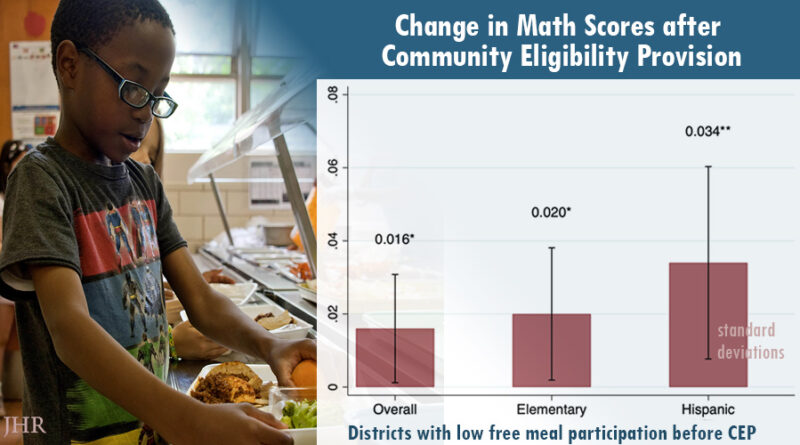Community Eligibility Provision? More Lunches Can Mean Better Math Performance
Historically, family income determined student eligibility for the school meals program—the largest nutritional assistance program for school-aged children in the United States. But recent reforms allow schools to offer free meals to all students. Although approximately one in four students attends a school offering school-wide free meals, there is little evidence of the impact of these initiatives on student achievement at a national level.
In a recent study, Krista Ruffini evaluates the effect of the largest school-wide free meals program, the Community Eligibility Provision (CEP), on academic performance. Ruffini compared the performance of students in early-adopting districts to those in districts adopting the program later. As a new federal initiative, CEP was incrementally rolled out, with schools becoming eligible over a four-year period based on state. Moreover, participation among eligible schools has increased over time.
Ruffini examines changes within a district before and after CEP participation by leveraging the variation in when districts adopted the program. It’s worth noting that while universal programs offer free meals to all students, areas where most students already qualified under income-based programs experience little change relative to areas with low baseline participation.
Ruffini finds that CEP improves math performance by about 0.02 standard deviations in districts where relatively few students had free meal access under the income-based program. Within these districts, elementary and Hispanic students experienced the largest gains. Taken together, these results suggest that school-based assistance can benefit groups that are unlikely to have access to traditional, family-income-based programs.
Read the full study in the Journal of Human Resources: “Universal Access to Free School Meals and Student Achievement: Evidence from the Community Eligibility Provision,” by Krista Ruffini.
***
Krista Ruffini (@KristaRuffini) is a Visiting Scholar at the Minneapolis Federal Reserve and Assistant Professor at the Court School of Public Policy, Georgetown University
The author gratefully acknowledges support from the Russell Sage Foundation and W.T. Grant Foundation (Grant #83-17-04).




